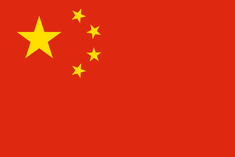
How Will China Be Remembered in History?
Last updated: Sunday June 26th, 2022
Report this blog
Introduction to the Series
Originally, I was planning on putting about 4-5 countries in this one blog, and talk about all of them at once. However, once I started writing about China, I realized I had much more to say than I thought. Therefore, I am splitting this blog up into a series, which will describe one country per blog.
Each blog will specify which country is being examined, and the historical comparison(s) to which I will be looking at it. I will look at the similarities and differences between them, and conclude with my own thoughts on how I think future generations will remember this country.
Disclaimer 1: This is not a somewhere where I express my political opinion of a country. I will try my best to refrain from any biases within this blog, and it would be appreciated if anyone who chooses to comment refrains from expressing any biases as well.
Disclaimer 2: I am not an expert at political or historical science, even though I enjoy the topic. Take what I say with a grain of salt, and do your own research before drawing to conclusions.
Current Country: The People's Republic of China
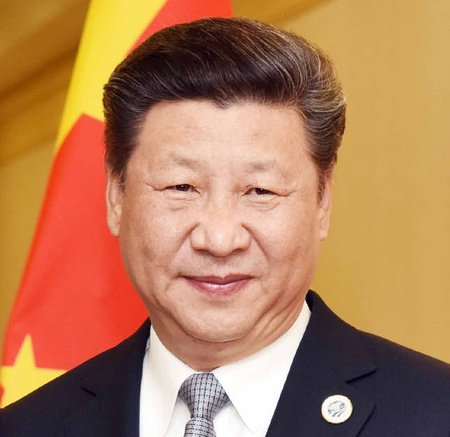
China is a giant on the world stage. It's the most populous country in the world, at 1.4 billion people, and is the third largest country in terms of land area. It has a massive army and economy, letting it have huge influence around the globe. Its authoritarian government rules the country with an iron fist, and produces strong external and internal policies, that it thinks will best help Chinese Communist Party.
The People's Republic of China is the largest competitor to the current global hegemon, and therefore is almost certainly going to play a huge role in the future of the world. Whether or not it will be greater than that of the US's, we will see over the next few decades.
Historical Comparison #1: The United States
This will likely be how China is remembered if they overtake the US without a war.
The United States in the early 20th century was the world's largest economy. It was an industrial powerhouse, but it still a bit behind European colonial powers, especially the global leader at the time, the British Empire. That all changed in the World Wars. World War I devastated Europe, while the US remained relatively unscathed. One could argue that the Allies would have fallen had the US not sent troops, given that the Eastern Front had dissipated, and Germany was moving its focus towards the West. Ultimately, the Allies were able to stay strong, and Germany surrendered. In the aftermath of the war, the American economy boomed, along with most of the West.
This had changed by the time World War II started. The world was still in the grips of a Great Depression that started a decade ago, and despite the best efforts of Franklin Delano Roosevelt, America's economy was still struggling, even though it was still the world's foremost economy. With the start of the Second World War, the American industrial giant roared back to life, with millions being hired to produce war goods, which were then shipped abroad towards Europe. This continued even after Pearl Harbor, until the end of the war. By then, the US had fully recovered from the Great Depression, with the economy being in very healthy shape. Europe, on the other hand, was even more ravaged than it had been by World War I. Much of Europe's industrial power had been blasted to smithereens. This allowed America to easily pull ahead with its economy, and subsequently, its military power, from the former foremost power, the British Empire.
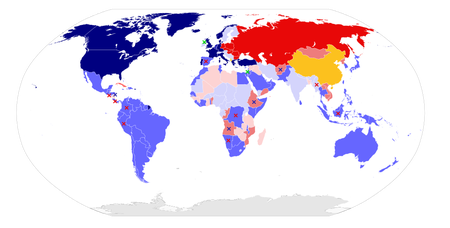
This transition from one global hegemon to the next was peaceful. This was mostly because America and Great Britain were allies, and had been for a while now, which left the latter not trying to challenge the former's rise to power. The Soviet Union also posed as an enemy to which both powers can unify against, which forced the two into an alliance once more.
This is quite different from today's new "Cold War" between the United States of 2021 and China. The two have quite hostile relations with each other, with the previous US President and the current US President not appearing to want to back down from this war of nerves. The US, unlike the British Empire before it, is also not very weakened at this point, although some might say its recent loss in Afghanistan is proof that America's military dominance is coming to an end.
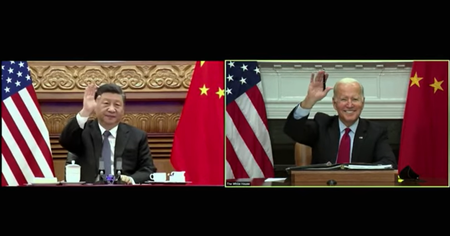
However, the reason I chose the US as a historical comparison is for economic reasons. As I said before, the US had been the most powerful economy in the world for a few decades by the 20th century. It also looks like China will surpass the US's economy pretty soon. Just like the US before it, though, China doesn't have the military capabilities that the current global hegemon has. Of course, if China can keep its large economic growth (which I see as iffy at best, I'll explain why later), it will at some point eventually surpass the American military. Of course, this will take a while, given that, as the world is much more stable now than it was a century ago, there really aren't that many World War I/II level catastrophes that can destroy America's military infrastructure. That isn't to say there are none; an example is North Korea launching ICBMs at the US, which will devastate it, but it is unlikely at worst.
Another important thing to remember is that the current Sino-American relation split is being mirrored around the world. The EU+UK and Russia+Belarus. South Korea+Japan+Taiwan and China. Much of the South China Sea. India and China+Pakistan. The USA and Iran. The US overtaking the British Empire was similar, in that it was a global event, but it wasn't a split. The two were still allies. However, the US began to influence British, as well as much of imperial Europe's objectives and decisions in a larger way than Great Britain did to the Americans.
Historical Comparison #2: The Roman Republic
This will likely be how China is remembered if they overtake the US with a war.
The Roman Republic is in some ways a better comparison, although it is far from perfect. Before the start of the Punic Wars, in 264 BC, Rome was the rising competitor, and Carthage was the dominant power in the Western Mediterranean, much like how China is the rising competitor to the US today. The key difference between this historical comparison and the previous one is that the Roman Republic and Carthage were actual rivals.
Carthage at the time was a powerful maritime civilization, while Rome had a strong army, but lacked a navy as extensive as Carthage's (just like the US and China today). Although they were able to coexist for the initial years of Rome's existence, conflicting claims on Sicily were mostly what caused an outbreak of war between the two powers. After an initial Roman push in Sicily, the war stalemated, until Rome built its own naval fleet to challenge Carthage. Surprisingly, even with Carthage's superior naval experience, Rome was able to decisively beat Carthage on numerous occasions, and eventually took over much of Sicily, although Carthage still maintained a naval advantage. However, the war's toll was what forced peace, with Carthage paying reparations and ceding Sicily to Rome, which could be seen as when Roman dominance of the Western Mediterranean began.
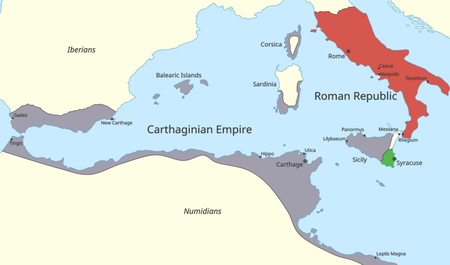
There were subsequent Punic Wars, but I will only cover the first one, since the next two only continued the trend of Rome upwards.
Anyhow, this first Punic War, while action-packed at first, eventually became a war of attrition, where both sides were unable to make much progress, and were essentially waiting to see who would cave in. This is probably thanks to a sea separating the two powers, with relatively evenly-matched navies (although Carthage had a slight experience advantage). However, Rome's more powerful army eventually came out on top, since Sicily, the main theater of the war, was very close to the Italian peninsula, making it relatively easy for Rome to transport equipment and soldiers to the island.
This is not the case with China and the United States. The US has a navy far more powerful than China's. Although you might have heard articles about China having the largest navy in the world, whether this is true or not, America most definitely has the better-equipped and higher-tech fleets. As for the enormous Pacific Ocean, time-space compression (the relative shrinking of the perception of space between one point and another as technology advances) has made it about as difficult to cross as the Mediterranean was for the Romans and Carthaginians.
Competition between the two also aren't only limited to them. The US has the support of NATO, Japan, South Korea, Israel, Australia, India, and New Zealand, to name a few. Meanwhile, China has the support of Russia, North Korea (probably), Pakistan, Iran, and some others. This means a hypothetical war would be global, and cause more economic, natural, social, demographic, and cultural destruction than the Punic Wars could have ever dreamed of achieving.
However, like I said, there are similarities. Taiwan today can be seen as the Sicily back then. A democratic stronghold that China is determined to take at any cost, Taiwan has long eluded the grasps of the CCP. However, Taiwan is far closer physically to China than it is to the US, well in range of many Chinese missiles. If history repeats itself in a future US-China conflict, we might see Taiwan conquered by China. On the other hand, the Taiwan Strait has treacherous seas, which would complicate an invasion. Taiwan and the US would also know when China begins planning to invade, since a huge movement of Chinese soldiers to the Southeast coast will definitely draw attention from the international community. In addition, Taiwan's military isn't a pushover, and they would likely plant mines, use their few submarines, and do anything possible to delay a Chinese landing. If the Chinese do manage to get onto the island, they'll have to face a resilient population that has been taught for years to resist the CCP.
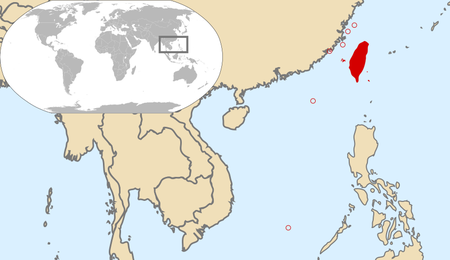
Another similarity is that, like Rome, China is primarily land-based, and, like Carthage, the US is primarily sea-based. If a war were to break out, China would definitely be able to resist invasions from the US, but the US would probably be able to strangle China's trade lines, forcing China to cross the Eurasian steppe to trade with other nations. This is primarily why China is creating the Belt-and-Road Initiative. It is questionable whether or not China can take Taiwan, or South Korea. If they can, they will likely dominate the East Asian front, and thus, probably the war. If not, they will have to focus massive amounts of resources on that front, draining them from other places of the war, like Europe, the Middle East, or India.
My Thoughts
There is a problem with these historical comparisons though: They assume that China will overtake the US. That is in no ways guaranteed. Unlike what much of the media (in America, at least) says, it is not inevitable that China will become the new global hegemon, and the US is destined to fade away into the pages of history.
It is undeniable that China is rising. However, we don't know yet if it has enough steam to surpass America. While it is probable that China will become the most powerful economy in the world over the next few decades (some stats already say it is), it has some problems. The most prominent one is demographics. China has a rapidly aging population, due to the one-child policy adopted under Deng Xiaoping. Although the government has tried to rectify this by changing the policy to two children in 2015, and three children more recently, it is already too late. China's median age is already greater than that of the US's, and the gap will only increase.
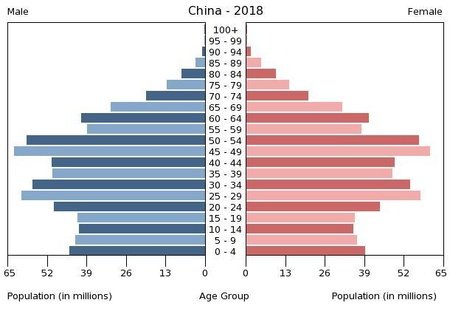
The reason why this is a problem for China is that they won't have the working-age populace to sustain their economic growth. China has long been known as the world's factory, but they can't be the factory if they begin to run out of workers. Albeit, the government has started try and transition away from manual labor, but a growing elderly population presents another problem. More working-age people will need to take care of elders, meaning China will be deprived of more workers whether in the tech sector, or the industry sector.
Another problem is China's social welfare system. Specifically, their retirement system. China does have social security, but there is a problem. Like the US, China's social security can fund income for elders by taking out money from the salaries of current workers. However, like I mentioned, the working-age population is declining, which will lower the amount of money that China's social security can distribute to retirees. This means that Chinese elders will have to rely on funds they've saved over their lives, as well as from their children, for income after retirement. The problem with this is that it means Chinese citizens will not spend as much money as Americans might in their lifetime, because they have to focus on saving more money. Spending is what drives an economy; less spending, a smaller economy. China has been able to bypass this over the last decades with its huge workforce, but as that workforce starts shrinking, and China grows into a developed country, if they can't get their citizens to spend more money on goods and services, China's economy is going to sputter out.
The last problem I'll discuss is it's government. China is an authoritarian regime, ruled with an iron fist by Xi Jinping. The reason why it's population hasn't rebelled against the government yet is for a simple reason: the government has been doing well. China's authoritarians have been able to bring hundreds of millions out of poverty, built up infrastructure, created a global trading system centered around them, and make their economy the second largest in the world. This may seem like a good thing. The problem is that it won't continue. China's government has only remained in place because the populace saw that their quality of life was improving, and they didn't really care about the system of government, as long as they were well-off. Like I explained before, though, it doesn't seem likely that China's economic growth model can continue. When it slows down, people are going to begin realizing that the CCP can't give them everything they want anymore, and they're going to start to get restless. China is also beginning to get international backlash due to the government's actions, and if sanctions, denounciations, and military buildups begin to affect the average Chinese citizen's way of life or thoughts, they could also foster unrest.
However, the one thing I want to mention is precedent. Over the last three thousand years, China has, more often than not, been the preeminent power on the globe. The reason we don't recognize them as such a powerful country is because, in the last century or so, the West had robbed and humiliated China, whilst becoming more powerful themselves. This is an extraordinary exception, with a country/group of countries that is not India, the Romans, or the Mongols becoming more powerful than China. However, China is coming back. An additional reason I didn't mention that the Chinese citizens tolerate their government is that they feel like their culture and their nation is getting the attention and power that they deserve. They feel like, for so long, they've been overshadowed by the West, and the fact that China is once again able to be on the global podium is refreshing.
The reason I mention this is that China's past humiliation is enough motivation to make the Chinese people determined to overtake the US, and the rest of the West, as global hegemon. It also proves that it is not impossible that China will displace the US, since they've been the most powerful nation on Earth so many times beforehand.
Conclusion
Ultimately, I think China will be remembered in history in the same way Japan might be now, but on a much larger scale. That is to say, they will not overtake the US (in terms of global hegemony), even though they appear to be on the way now, like Japan looked like in the late 20th century. While I may be biased as an American, I think I've expressed enough reasoning to support my claim. Like Japan, they experienced rapid economic growth, but I think it likely that the growth will quickly stagnate in a decade or so.
The biggest unknown factor, though, is the possibility of war, and the outcome of it. If what I said was true, and Chinese economic stagnation is to come, war is pretty likely. To boost nationalistic pride, and focus the populace outwards, China could provoke a war with Taiwan. The outcome of the war is what would determine China's legacy (history is written by the winners). If China wins, they will be remembered much like the Allies are now in World War II. If China loses... they will likely be remembered like the USSR is now. However, China will most likely NOT dissolve, although it might break into several warring factions. This is since China as a nation has way too strong of an identity to be broken, and the Chinese mainland will likely not be invaded anyways due to the incomprehensible logistics of trying to attempt such an invasion.
In my final judgement, I took out the factor of war because that would make it way too inconclusive. Of course, I'm not saying that what I said is guaranteed; I can't tell the future, I can only speculate about it. However, this is what I think will happen, based on what I know about China.
Anyhow, thanks for reading the blog! It's easily the longest I've made so far, and the one I worked on hardest. If you liked the topic, I highly recommend watching Whatifalthist's video about it here. He goes far more in-depth than I did, and knows a lot more than me. I would welcome any constructive criticism/corrections that would improve the quality of the blog. Also, some suggestions for the next country that I will write about would be welcome!
Last note: Although I doubt most of you reading this will care, I'm going to take a break from blogging over the next 1-3 weeks. The primary reasons are because of school, and also because I want to develop new blog ideas, and make them into higher-quality blogs. I will still read and occasionally comment on blogs though, and I will definitely be closely watching the Blog Games!

OhmygoodnessIcan'tbelieveBigGeographyGuyactuallycommentedonmyblogaaaaaaaaaaaaaahhhhhAnd cool blog! You’re improving a lot in quality!
I doubt they will comment, not gonna lieAside from that, my point in the blog is that Chinese retirees won't have enough income after they retire to sustain themselves. Based on the declining workforce, the number of current working persons per retiree is going to decrease significantly, which will definitely hurt future Chinese elders, and will probably motivate them to save, rather than spend. I will have to amend my blog to incorporate this though, so, again, thanks for telling me.
Anyhow, thank you for reading, and I'm glad you were able to learn new things!
I'm excited to see more countries!
Looking forward to the others
and also I don't want to get bannedI'll try my best to get the other blogs out before the New Year!